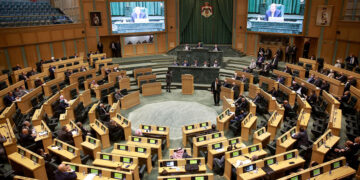43 Global Civil Society Organizations, including DAWN, Call for the Release of Patrick Zaki, Egypt Initiative for Human Rights Researcher, Sentenced to Three Years in Prison for an Article
Updates: July 20: On July 19, 2023, President Sisi pardoned Patrick Zaki and Mohamed al-Baker, a human rights lawyer, in response to massive global outrage and condemnation of Zaki's sentencing. Both were released from prison the next day. DAWN continues to call on Egypt to overturn Zaki's and al-Baker's sentences and convictions, and release all other political prisoners.
***
(Washington, DC, July 18, 2023): At least three leading activists and lawyers have announced their withdrawal from the country's so-called "National Dialogue" after Egypt's emergency state security court sentenced human rights defender and academic Patrick George Zaki to three years in prison on trumped up charges, said Democracy for the Arab World Now (DAWN).
"At the very same time President Sisi is proclaiming the National Dialogue as evidence of his reform agenda, its legitimate civil society participants are pulling out in disgust at his continued attacks against them, like today's sentencing of Zaki," said Sarah Leah Whitson, DAWN's Executive Director. "To restore any remaining faith in the National Dialogue, Sisi should refuse to ratify Zaki's sentence and immediately release him and all other political prisoners."
On July 18, 2023, at least three leading Egyptian activists announced their withdrawal from the National Dialogue, citing Zaki's sentencing by the authorities that day. They include Nabeh Elganadai, a lawyer with the independent Egyptian Initiative for Personal Rights (EIPR); Negad El Borai, a lawyer and the head of the legal unit at United Group for Law; and Khaled Dawoud, deputy editor-in-chief of Al-Ahram Weekly, former president of the social-liberal Dostour Party, and a former political prisoner for whose release DAWN had advocated. Egypt's Abdel Fattah El-Sisi had surprised both his political supporters and opponents when he announced in April 2022 that the Egyptian government would hold a National Dialogue to allow for national reconciliation through broad participation of "all of the country's political forces, without exception or discrimination." The Dialogue, which was launched on May 3, 2023, has been increasingly criticized as a ploy to appease the West.
An Egyptian emergency state security court sentenced Zaki on July 18 to three years in prison for "spreading false news" under Article 102 of the penal code in his 2019 article, "Displacement, Killing & Harassment: A Week in the Diaries of Egypt's Copts." Egyptian courts typically rely on this provision of the penal code to sentence human rights activists and journalists for speech even remotely critical of the government. Defendants cannot appeal verdicts by Egyptian state security courts but the verdicts require ratification by the President, who can also quash or commute sentences.
Egyptian authorities had arrested Zaki on February 7, 2020, at the Cairo Airport while he was visiting home from his studies at the University of Bologna. They held him incommunicado for 24 hours and subjected him to torture by beating, electrocution, verbal abuse, and threats. The authorities initially accused him of joining a terrorist organization and spreading false news.
In September 2021, his lawyers learned that the authorities had referred Zaki to an emergency state security court on the charge of spreading false news. After 22 months in pretrial detention, the authorities released Zaki on December 7, 2021, but placed him on a travel ban pending his trial. The authorities rearrested him after his sentencing in violation of Circular No. 10 of 2017, which governs emergency state security courts and stipulates that "if the accused is brought to trial while not in custody and sentenced to a prison penalty, he must be released immediately without executing the penalty pending the decision of the ratifying authority."
Egypt's National Dialogue is designed to provide a forum for a diverse group of participants, including political and social leaders, to address the country's political, social, and economic crises and spur meaningful discussion on how best to chart the country's future. Critics have opposed it as a process lacking in substance and designed to give the appearance of doing something, even as the government maintains its repressive grip on Egyptian society and political activity. Critics also believe that the process is little more than a ploy to distract Egyptians from the country's economic crisis. Supporters have defended the process as a genuine effort toward reconciliation and an opportunity to make limited gains in opening Egypt's closed political space.
"All along, Sisi has played a double game, marketing his 'National Dialogue' as a reform process, while relentlessly persecuting the country's human rights activists and journalists," added Whitson. "Today's sentencing of Zaki should lay to rest any illusions that Sisi's reform efforts are anything more than a show for the West."
Despite Sisi's assurances to "accommodate all" and allow "for difference of opinion," a pronounced lack of trust has cast a shadow over the National Dialogue from its start. In response, numerous opposition figures and human rights organizations called for the release of a significant number of political prisoners as a precondition for their participation in the National Dialogue. Since coming to power in a 2013 military coup, the Sisi government has detained and arrested tens of thousands of Egyptians through systemic repression and a brutal crackdown on civil and political rights. Human rights organizations estimate that there are at least 60,000 political prisoners in Egypt, many of whom have not received a fair trial or even been tried, as their charges are simply recycled into different cases through the government's abusive use of pretrial detention. These oppressive practices and diminished political space have all but eliminated any belief in the Sisi government's genuine desire to allow meaningful political reform.
"It's no surprise to see this sentencing on the heels of the Biden administration circumventing Congressional attempts to cut the flow of US military aid to Egypt," said Raed Jarrar, DAWN's Advocacy Director. "President Biden and Secretary Blinken need to recognize that continued military support is begetting nothing more than brazen abuses and impunity by an apparently still-favored dictator."
The Biden administration has until September 30, 2023, to decide whether Egypt meets six human rights conditions that the US Congress attached to $320 million of Foreign Military Financing (FMF) for Egypt from the 2022 fiscal year. The administration can use a national security waiver to release $235 million of the $320 million. In the previous year, the administration determined that Egypt had achieved "clear and consistent" human rights progress and used the national security waiver to release $170 million, including $75 million conditioned without a national security waiver on the release of political prisoners and the provision of due process to detainees. The Congress objected, withheld the $75 million, and eventually returned it to the US Treasury.







































